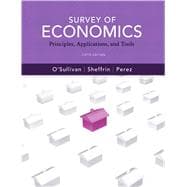
is a professor of economics at Lewis and Clark College in Portland, Oregon. After receiving his B.S.
in economics at the University of Oregon, he spent two years in the Peace Corps, working with city
planners in the Philippines. He received his Ph.D. in economics from Princeton University in 1981
and has taught at the University of California, Davis, and Oregon State University, winning teaching
awards at both schools. He is the author of the best-selling textbook Urban Economics, currently in its
seventh edition.
Professor O’Sullivan’s research explores economic issues concerning urban land use, environmental
protection, and public policy. His articles have appeared in many economics journals, including the
Journal of Urban Economics, Journal of Environmental Economics and Management, National Tax Journal,
Journal of Public Economics, and Journal of Law and Economics.
Professor O’Sullivan lives with his family in Portland, Oregon. For recreation, he enjoys hiking,
kiteboarding, and squash.
STEVEN M. SHEFFRIN
is professor of economics and executive director of the Murphy Institute at Tulane University. Prior to
joining Tulane in 2010, he was a faculty member at the University of California, Davis, and served as
department chairman of economics and dean of social sciences. He has been a visiting professor at
Princeton University, Oxford University, London School of Economics, and Nanyang Technological
University, and he has served as a financial economist with the Office of Tax Analysis of the United
States Department of the Treasury. He received his B.A. from Wesleyan University and his Ph.D. in
economics from the Massachusetts Institute of Technology.
Professor Sheffrin is the author of 10 other books and monographs and over 100 articles in the
fields of macroeconomics, public finance, and international economics. His most recent books
include Rational Expectations (second edition) and Property Taxes and Tax Revolts: The Legacy of
Proposition 13 (with Arthur O’Sullivan and Terri Sexton).
Professor Sheffrin has taught macroeconomics and public finance at all levels, from general introduction
to principles classes (enrollments of 400) to graduate classes for doctoral students. He is the
recipient of the Thomas Mayer Distinguished Teaching Award in economics.
He lives with his wife Anjali (also an economist) in New Orleans, Louisiana, and has two daughters
who have studied economics. In addition to a passion for current affairs and travel, he plays a
tough game of tennis.
STEPHEN J. PEREZ
is a professor of economics and NCAA faculty athletics representative at California State University,
Sacramento. After receiving his B.A. in economics at the University of California, San Diego, he was
awarded his Ph.D. in economics from the University of California, Davis, in 1994. He taught economics
at Virginia Commonwealth University and Washington State University before coming to California
State University, Sacramento, in 2001. He teaches macroeconomics at all levels as well as econometrics,
sports economics, labor economics, and mathematics for economists.
Professor Perez’s research explores most macroeconomic topics. In particular, he is interested
in evaluating the ability of econometric techniques to discover the truth, issues of causality in
macroeconomics, and sports economics. His articles have appeared in many economics journals,
including the Journal of Monetary Economics; Econometrics Journal; Economics Letters; Journal of
Economic Methodology; Public Finance and Management; Journal of Economics and Business; Oxford
Bulletin of Economics and Statistics; Journal of Money, Credit, and Banking; Applied Economics; and
Journal of Macroeconomics.
Table of Contents
1. Introduction
2. Key Principles of Economics
3. Demand, Supply, and Market Equilibrium
4. Elasticity: A Measure of Responsiveness
5. Production and Cost
6. Perfect Competition: Short Run and Long Run
7. Monopoly
8. Monopolistic Competition, Oligopoly, and Antitrust
9. Market Failure: Imperfect Information, Pollution, and Public Goods
10. The Labor Market
11. Measuring a Nation’s Production and Income
12. Unemployment and Inflation
13. Why Do Economies Grow
14. Aggregate Demand and Supply
15. Fiscal Policy
16. Money and the Banking System
17. Monetary Policy and Inflation
18. International Trade and Finance
The New copy of this book will include any supplemental materials advertised. Please check the title of the book to determine if it should include any access cards, study guides, lab manuals, CDs, etc.
The Used, Rental and eBook copies of this book are not guaranteed to include any supplemental materials. Typically, only the book itself is included. This is true even if the title states it includes any access cards, study guides, lab manuals, CDs, etc.